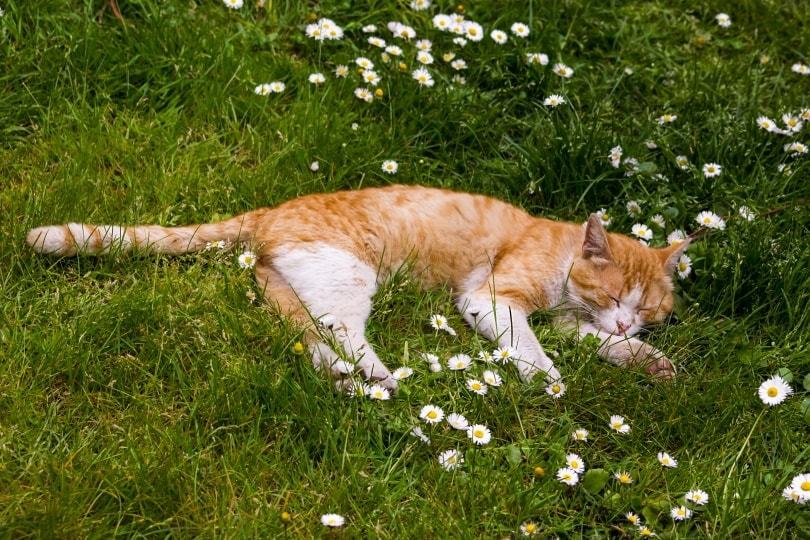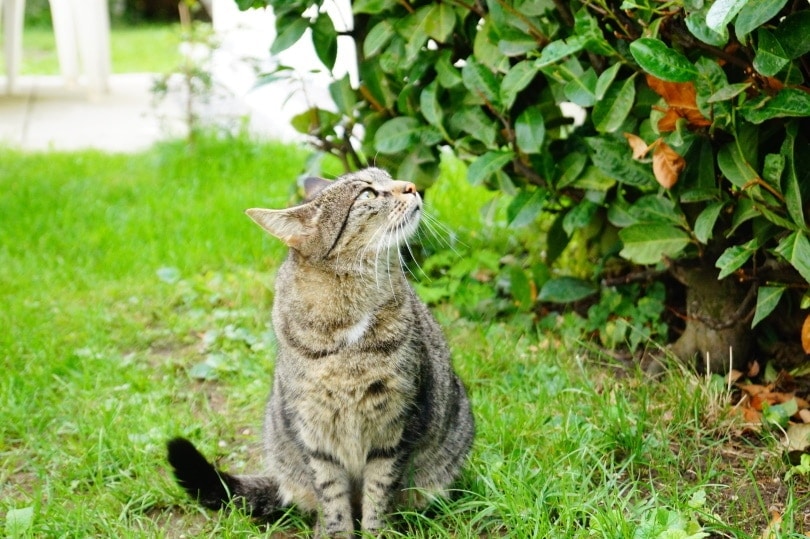Can Cats Eat Clover? Vet-Reviewed Health & Safety Guide

Updated on

Cats like to explore and sample just about anything they come across, including plants. While most cats are unlikely to eat a lot of plants, some are highly toxic for them, even in small doses.
Can cats eat clover? No, cats shouldn’t eat clover due to its risk to their health. While the toxicity varies by the clover species, all clovers have the potential to cause adverse effects in cats in large enough amounts.
Clover Toxicity in Cats
Clover plants contain calcium oxalates. Once ingested, calcium oxalates bind to calcium in your cat’s bloodstream, which eventually end up as crystals in your cat’s urinary tract. This can result in a kidney infection or bladder stones. In addition, the lack of calcium will result in other detrimental signs in your cat. The signs vary and depend on how much clover your cat has ingested.
- Pain, especially in the abdomen
- Inappetence
- Excessive drooling
- Diarrhea
- Vomiting
- Tremors
What Types of Clover Are Hazardous for Cats?
When most people think of a clover, they imagine shamrocks (the “good luck” plant). Shamrock also goes by the name of clover or wood sorrel. As part of the Oxalis family, shamrock has calcium oxalate that can be toxic to cats in high amounts. These compounds are found in every portion of the plant – not just the leaves.
If your cat ingests clover, it’s important to act quickly. Shamrock and other clover species can lead to significant gastrointestinal distress or kidney failure. If you notice your cat eating clover or discover clover in their vomit or in your home, take your cat to the vet immediately.
What Plants Are Poisonous to Cats?
Many common plants are toxic for cats and may cause irritation of the skin, mouth, or stomach, as well as organ damage or other adverse effects.

Here are some plants that are poisonous to cats:
Typically, a plant that’s poisonous to cats is the result of a compound or substance, which is present throughout the plant. Some plants have higher concentrations of toxic substances in leaves, stems, or petals, so it’s best to avoid them altogether.
The toxic dose can vary by plant, plant part, and cat size as well, so don’t underestimate the effects if your cat had only a small amount. It’s important to watch for signs of toxicity.

What Are the Signs of Plant Poisoning?
Toxic plants can cause a variety of signs in cats, ranging from local skin irritation to serious organ or gastrointestinal distress.
- Swelling, redness, or itchiness to skin or mucous membranes
- Stomach upset, vomiting, or diarrhea
- Respiratory distress
- Difficulty swallowing or drooling
- Excessive thirst and urine production
- Changes in heart rhythm
- Weakness and lethargy
What to Do if Your Cat Ingested a Toxic Plant
If your cat ate a plant that you believe may be poisonous, it’s important to take them to the vet as soon as possible. If possible, bring some of the plant with you in a plastic bag, or take a picture of the plant for the vet to identify it.
When you get your cat to the vet, they will begin by assessing your feline. The treatment’s main goal would be to ascertain the extent of the plant poisoning in your cat and identify how they can help your cat feel better. There is no particular antidote for plant poisonings, so all treatment is purely supportive based on the signs your cat displays. That being said, you may notice your vet perform one or more of the following:
- Induce vomiting – if the plant was eaten recently
- Administer fluid therapy
- Perform bloodwork and other laboratory tests as needed
- Prescribe medication depending on the signs your cat is showing
- Monitor your cat to progress their recovery
- Offer a prescription diet and additional supplements throughout recovery
As with all poisonings, it is best to follow your vet’s lead and advice on any care, treatment, and post-discharge instructions.
Now that you know what you can safely feed your cat, it’s just as important to find a bowl that supports their health and well-being. With whisker-friendly bowls and a wide tray to catch any spills, our Hepper NomNom Cat Bowl is our favorite option.
Protect Your Cat From Clover
Clover is among the common toxic plants for cats. Though the toxicity and effects vary by the type of clover, no clover species is safe for your cat to ingest. If you suspect your cat ingested shamrock or another toxic plant, take them to the vet as soon as possible.
Featured Image Credit: Carabo_Spain, Pixabay












